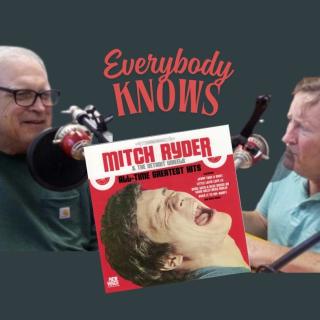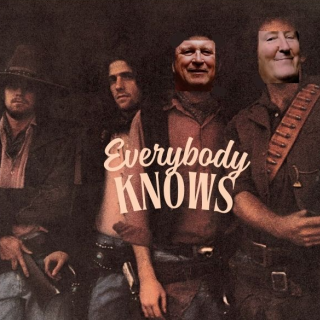On their new release, “Also Playing,” the Devil Doves’ sound has departed significantly from their 2015 eponymous debut album. The ultra-percussive attack that characterized the previous effort has been filled out and somewhat sweetened by the addition of keyboardist Jeff Straw and the occasional lead guitar riff. While there is still plenty of crunch, Straw’s whimsical organ and saloon piano offer a welcome bit of melody to fill out the space between Junior Kauffman’s vocals.
Lyrically, Kauffman continues to display his ability to blend the harmless and the deadly serious with his trademark wry humor. This time around, though, he’s more willing to explore relationships. He addresses both regret and the paralyzing ambivalence we have all fallen into at one point or the other. On the other side of the coin, he celebrates resiliency and the possibility of renewing a sense of adventure.
The album opens with “Papa Tried,” a joyous romp through a family history which is both tragic and slightly deranged. The transition from verse to chorus is wonderfully crafted, if you don't mind that it signals the advent of Grandma's lung cancer. Caution though – the main riff will get in your head and make common household tasks difficult to take seriously.
The second track, “Wicked,” stands for the modest proposition that it would be pretty nice to drop the kids off at Grandma's, take your lady down to Mexico and get plastered every night. Words cannot express my total support of this concept. If anyone thinks that's wicked, screw them.
Track 3, “Song and Dance,” is on the receiving end of a relationship in trouble: “[y]ou've got a dozen personalities, and I don't know which one I'll get.” Beneath a facade of organ playing, fundamentally “it was fun but now you're done.”
Track 4, “Bad Seed,” is a throwback to the last album. It's all muscle and crack, scat verses and a gleeful shouted chorus of “hey, you, say, you're a bad seed!” Nobody but these guys could pull off a tune like this.
Next up, “Good Question” is breezy and light, and features this lyrical gem: “I'm not good at numbers and names, authority or open flames.” Truth.
Track 6, “Who do you think,” addresses the age old theme of the jilted lover prophesying a low quality future relationship for their ex. That is, there is no way new person will love you the way I did, remember your birthday, change your oil and drop off your dry cleaning etc. Kauffman turns this idea on its head, demanding that his lady tell him who is going to take care of his various and sundry needs after she walks out the door. We all know the response is incredulity and “how the hell should I know,” but it’s still pretty amusing. There was that weird bar in Chillicothe, after all.
My favorite song on the album, “Untitled Murder Song #4” takes you to a movie set of a cold eyed world with death walking around the corner. Spooky, and somehow both theatrical and uncomfortably real. You think it’s just a movie but you’re locking the doors just in case.
“Cosmic Freight Train” is the only miss on the album, a sort of standard rock tune dominated by a persistent and annoying synth riff. For whatever reason I couldn't make out most of the lyrics even after several plays, which is odd for Kauffman (despite his gruffness he's typically pretty discernible). Maybe it has a theme, but I wasn’t able to get my brain around it.
Track 9, “Hearing Test” pulls you into a world of claustrophobic self-reflection, with a narrator “lie[s] awake at night disregarding things to say.” It’s a window into those bad moments when you can’t keep down the feeling that you have everything you want but don’t know what to do with it.
Track 10, “Traveling Circus,” gives the initial impression that it is a road tune, but then reveals itself as a love song. It's Sweet, light and only slightly rueful. It reminds you that good love songs are hard to find.
The album closes out with “Birdy Bones,” a meandering tribute to a fickle lover, an untrustworthy muse, or perhaps both. It’s a song that can’t seem to decide whether it’s important or not; it makes statements and then walks them back, surrendering to insecurity by qualifying or fuzzing things up. In the end it just sort of meanders away, making you wonder if the conversation actually happened.
No album is perfect – the Doves succumb to a little studio silliness with talking voices in the background, and at times the vocal arrangements might be a little too well thought out. But this is a very special album from one of Columbus' best bands. If you want my advice, play it loud from a car stereo.



